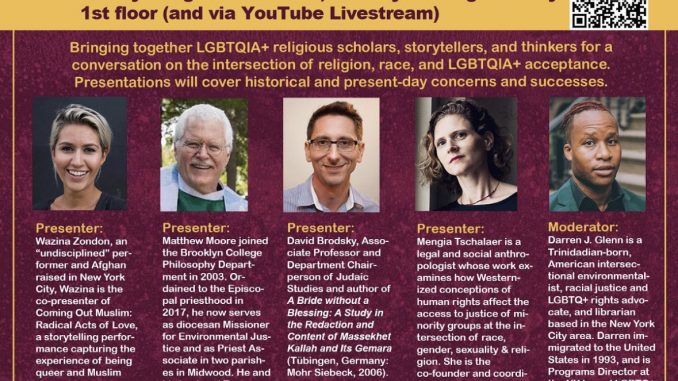
By Serin Sarsour
Religious scholars, thinkers, and storytellers were invited to discuss the intersection of religion, race, and LGBTQIA+ acceptance last Wednesday, Mar. 15. Guest speakers presented present-day and historical concerns and successes that took on the question of queer acceptance in religious institutions. The event was hosted by BC’s LGBTQ+ Resource Center in the Woody Tanger Auditorium at Brooklyn College.
Darren J. Glenn, the panel’s moderator and a librarian based in New York City, kicked off the panel by inviting the audience to “think inwardly about our interactions with religious institutions” and their experiences in “the world of organized religion,” such as memories of being in a house of worship at a young age. He then asked attendees to think about the feelings that come with those memories, whether that be joy or exasperation. In this, Glenn highlighted the complicated relationships and interactions many people have with religious institutions, including himself as a Christian who is an intersectional environmentalist, racial justice, and LGBTQ+ rights advocate. He noted that he has felt judged, excluded, and even unsafe at times within Christian social circles, especially as a child, because he is queer.
The event aimed to explore and remove the theology and scholarship pertaining to religion, along with how established belief systems interact with gender, race, and sexuality. The panel also examined the human impact of these interactions, and the emotional and spiritual consequences of religiously-informed racism, sexism, and anti-LGBT sentiment.
“Is there room for us? No, but we make room,” said Wazina Zondon, the first presenter of the panel, as she answered the question within the title of the event: “At the Intersection of Religion, Race, and LGBTQIA+, is there room for Acceptance? A Discussion.” She later noted that as a queer Muslim, she is not offered the same “multiplicity and variation in existence” as other queer people when she reveals her religious identity to people. She described this as a “limiting experience” and questioned “how much spaciousness you are given even in your own identities.”
Mengia Tschalaer, another presenter for the event who is a legal and social anthropologist, focused on the asylum system in Germany that has to deal with the intersection of sexuality and religion. She discussed how the system relied on western stereotypes about things like gender identity and anti-Muslim attitudes.
“In Germany, the right for asylum is enshrined in the German basic law […] and is granted to anyone who can establish a well-rounded fear of political persecution due to their race, religion, nationality, political views, or their membership of a particular group, which includes individuals who have fled their countries due to their sexual orientation and/or gender identity,” Tschalaer said.
The third presenter of the event, Brooklyn College Associate Professor and Department Chair of Judaic Studies David Brodsky, started his segment by addressing that for the most part, LGBTQ issues are no longer a problem in the Reform movement, the Reconstructionist movement, and the Conservative movement of Judaism. However, he noted that there is still an issue that resides in some Orthodox Jewish communities.
“[…] The larger problem is not with Jewish law or Christian law or Muslim law. The larger problem is with the challenge that LGBTQ issues pose on people living in gender-rigid structures in societies,” said Brodsky, explaining that this has to do with the range of options available within each religion in terms of the forgiving of sins.
Brodsky went on to say that the way to gain acceptance in religious communities and institutions isn’t by arguing about the law, it’s by making people see the human in you so that they are able to relate to you in some sense and may eventually come around.
Matthew Moore, a philosophy professor at BC, as well as a missioner and a priest, was the final presenter of the day. He turned the main question of the event on its head and asked the audience: “Does religion leave room for rejection of queer people?”
As a Christian, Moore offered two answers to his question. “If you’re talking about religion as an institution, my answer is not forever. And if you’re talking about religion as a living spiritual force, my answer is not now and not ever.”
However, Moore noted that with the violent political and physical attacks on the queer community, especially trans people, he would be “delusional” to believe that all is well for queer people. There is still a long way to go.
